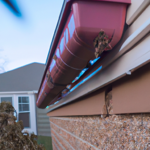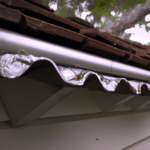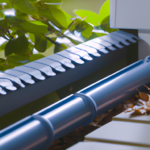-
Table of Contents
- Introduction
- Rainwater Harvesting: A Sustainable Solution for Water Conservation
- Eco-Friendly Gutters: The Future of Green Building
- Promoting Sustainability with Environmentally-Friendly Gutter Systems
- The Benefits of Rainwater Harvesting for Your Home and the Environment
- Water Conservation Made Easy with Sustainable Gutter Systems
- Q&A
- Conclusion
“Harvest rainwater, save water, promote sustainability with Sustainable Gutter Systems.”
Introduction
Sustainable gutter systems, such as rainwater harvesting systems, are designed to reduce water waste and promote sustainability. These systems collect rainwater from rooftops and store it for later use, such as watering plants or flushing toilets. By using rainwater instead of tap water, these systems can help conserve water resources and reduce the strain on municipal water supplies. Additionally, sustainable gutter systems can help prevent soil erosion and reduce the risk of flooding by directing rainwater away from buildings and into designated areas. Overall, these environmentally-friendly systems offer a practical and effective solution for promoting sustainability and reducing water waste.
Rainwater Harvesting: A Sustainable Solution for Water Conservation
rainwater harvesting: A Sustainable Solution for water conservation
Water is a precious resource that is essential for life. However, with the increasing population and climate change, water scarcity has become a major concern. In many parts of the world, people are facing water shortages, and the situation is only getting worse. Therefore, it is important to find sustainable solutions to conserve water and reduce wastage. One such solution is rainwater harvesting.
rainwater harvesting is the process of collecting and storing rainwater for later use. It is a simple and effective way to conserve water and reduce the demand for municipal water supply. rainwater harvesting systems can be installed in homes, buildings, and even in large-scale projects like parks and gardens.
The benefits of rainwater harvesting are numerous. Firstly, it reduces the demand for municipal water supply, which in turn reduces the strain on the water supply system. This is particularly important in areas where water scarcity is a major concern. Secondly, rainwater harvesting systems can help to reduce water bills, as the collected rainwater can be used for non-potable purposes like watering plants, washing cars, and flushing toilets. Thirdly, rainwater harvesting systems can help to reduce the risk of flooding, as they can capture and store excess rainwater that would otherwise run off into the streets and cause flooding.
rainwater harvesting systems are also environmentally friendly. They promote sustainability by reducing the need for energy-intensive water treatment processes and reducing the amount of water that is wasted. In addition, rainwater harvesting systems can help to reduce the amount of pollution that enters our waterways, as they capture and store rainwater before it can pick up pollutants from the ground.
There are several types of rainwater harvesting systems available, including above-ground and below-ground systems. Above-ground systems are typically installed on rooftops and collect rainwater that falls on the roof. The collected rainwater is then stored in a tank or cistern for later use. Below-ground systems, on the other hand, are installed underground and collect rainwater that falls on the ground. The collected rainwater is then filtered and stored in a tank or cistern for later use.
When choosing a rainwater harvesting system, it is important to consider the size of the system, the amount of rainfall in the area, and the intended use of the collected rainwater. It is also important to ensure that the system is properly installed and maintained to ensure maximum efficiency and longevity.
In conclusion, rainwater harvesting is a sustainable solution for water conservation that can help to reduce water waste and promote sustainability. By collecting and storing rainwater, we can reduce the demand for municipal water supply, reduce water bills, and reduce the risk of flooding. rainwater harvesting systems are also environmentally friendly, as they reduce the need for energy-intensive water treatment processes and reduce the amount of water that is wasted. Therefore, it is important to consider installing a rainwater harvesting system in your home or building to help conserve water and promote sustainability.
Eco-Friendly Gutters: The Future of Green Building
As the world becomes more conscious of the impact of human activities on the environment, the construction industry is also taking steps towards sustainability. One of the areas where eco-friendliness is gaining traction is in gutter systems. Traditional gutter systems are designed to collect rainwater and direct it away from the building, but they do not take into account the potential benefits of harvesting rainwater. Sustainable gutter systems, such as rainwater harvesting systems, are becoming increasingly popular as they offer a range of benefits that go beyond just collecting rainwater.
rainwater harvesting systems are designed to collect rainwater from the roof and store it for later use. The collected water can be used for a variety of purposes, including irrigation, flushing toilets, and washing clothes. By using rainwater for these purposes, homeowners can reduce their reliance on municipal water supplies, which can be expensive and often come from unsustainable sources. Additionally, rainwater harvesting systems can help reduce water waste by capturing rainwater that would otherwise be lost to runoff.
One of the key benefits of rainwater harvesting systems is that they promote sustainability. By reducing reliance on municipal water supplies, homeowners can help conserve water resources and reduce the strain on the environment. Additionally, rainwater harvesting systems can help reduce the amount of energy needed to treat and transport water, which can further reduce the carbon footprint of a building.
Another benefit of rainwater harvesting systems is that they can help reduce the risk of flooding. Traditional gutter systems are designed to direct rainwater away from the building, but this can lead to problems if the water is not properly managed. By collecting rainwater and storing it for later use, rainwater harvesting systems can help reduce the amount of water that enters the stormwater system, which can help prevent flooding.
rainwater harvesting systems are also relatively easy to install and maintain. While traditional gutter systems require regular cleaning to prevent clogs and blockages, rainwater harvesting systems are designed to capture and store rainwater, which means they require less maintenance. Additionally, rainwater harvesting systems can be integrated into the design of a building, which can help improve the aesthetic appeal of the property.
In conclusion, sustainable gutter systems, such as rainwater harvesting systems, are becoming increasingly popular as they offer a range of benefits that go beyond just collecting rainwater. By reducing reliance on municipal water supplies, promoting sustainability, reducing the risk of flooding, and being relatively easy to install and maintain, rainwater harvesting systems are the future of green building. As the world becomes more conscious of the impact of human activities on the environment, it is important that we continue to explore new ways to promote sustainability in all areas of our lives, including in the construction industry. By embracing sustainable gutter systems, we can help reduce our impact on the environment and create a more sustainable future for generations to come.
Promoting Sustainability with Environmentally-Friendly Gutter Systems

Sustainable Gutter Systems: Promoting Sustainability with Environmentally-Friendly Gutter Systems
Gutter systems are an essential part of any building’s infrastructure. They are designed to collect rainwater and direct it away from the building’s foundation, preventing water damage and erosion. However, traditional gutter systems are not always environmentally friendly. They can contribute to water waste and pollution, which is why sustainable gutter systems are becoming increasingly popular.
One of the most significant benefits of sustainable gutter systems is that they can reduce water waste. Traditional gutter systems collect rainwater and direct it to the ground, where it can be lost to evaporation or runoff. This means that a significant amount of water is wasted, especially in areas with low rainfall. Sustainable gutter systems, such as rainwater harvesting systems, collect rainwater and store it for later use. This water can be used for irrigation, flushing toilets, and even drinking water with proper filtration.
rainwater harvesting systems are also beneficial for the environment. By collecting rainwater, these systems reduce the amount of water that needs to be pumped from underground aquifers or surface water sources. This can help to conserve these resources and reduce the energy required to pump and treat water. Additionally, rainwater harvesting systems can help to reduce stormwater runoff, which can contribute to flooding and erosion.
Another way that sustainable gutter systems can promote sustainability is by reducing pollution. Traditional gutter systems can collect pollutants, such as debris, chemicals, and bacteria, and direct them into storm drains and waterways. This can harm aquatic ecosystems and even pose a risk to human health. Sustainable gutter systems, such as green roofs and vegetated swales, can help to filter pollutants from rainwater before it enters the environment. Green roofs are covered in vegetation, which can absorb pollutants and reduce runoff. Vegetated swales are shallow channels filled with vegetation, which can slow down and filter stormwater runoff.
Sustainable gutter systems can also help to reduce the urban heat island effect. Traditional gutter systems can contribute to this effect by directing rainwater into paved areas, which can absorb and retain heat. Sustainable gutter systems, such as green roofs and rain gardens, can help to cool urban areas by providing shade and evapotranspiration. Green roofs can absorb and reflect sunlight, reducing the amount of heat absorbed by buildings. Rain gardens are designed to collect and filter rainwater, which can help to cool the surrounding area.
In conclusion, sustainable gutter systems are an excellent way to promote sustainability and reduce environmental impact. They can reduce water waste, conserve resources, reduce pollution, and even help to cool urban areas. If you are considering installing a new gutter system, consider choosing a sustainable option, such as a rainwater harvesting system, green roof, or vegetated swale. These systems can help to protect the environment and promote a more sustainable future.
The Benefits of Rainwater Harvesting for Your Home and the Environment
rainwater harvesting is a sustainable and eco-friendly way to collect and store rainwater for later use. This practice has been around for centuries, but it has gained popularity in recent years due to the increasing concern for the environment and the need to conserve water. rainwater harvesting systems can be installed in homes, businesses, and public buildings to reduce water waste and promote sustainability.
One of the main benefits of rainwater harvesting is that it reduces the demand for municipal water supplies. Municipal water supplies are often treated with chemicals and additives that can be harmful to the environment and human health. By using rainwater for non-potable purposes such as watering plants, flushing toilets, and washing clothes, homeowners can reduce their reliance on municipal water supplies and help protect the environment.
rainwater harvesting systems can also help reduce water bills. By collecting and using rainwater, homeowners can reduce their water bills and save money in the long run. This is especially true in areas where water is scarce or expensive. In addition, rainwater harvesting systems can help reduce the strain on municipal water supplies during times of drought or water shortages.
Another benefit of rainwater harvesting is that it can help prevent soil erosion and flooding. When rainwater is collected and stored, it can be used to irrigate plants and trees, which helps to prevent soil erosion and promote healthy plant growth. In addition, rainwater harvesting systems can help reduce the risk of flooding by diverting excess water away from buildings and other structures.
rainwater harvesting systems are also easy to install and maintain. Most systems consist of a collection tank, a filtration system, and a pump. The collection tank can be installed above or below ground, depending on the homeowner’s preference. The filtration system removes debris and contaminants from the water, ensuring that it is safe for use. The pump then delivers the water to where it is needed.
Finally, rainwater harvesting systems are environmentally friendly. By reducing the demand for municipal water supplies, homeowners can help conserve water and protect the environment. In addition, rainwater harvesting systems can help reduce the amount of stormwater runoff that enters rivers and streams, which can be harmful to aquatic life.
In conclusion, rainwater harvesting is a sustainable and eco-friendly way to collect and store rainwater for later use. It has many benefits, including reducing the demand for municipal water supplies, reducing water bills, preventing soil erosion and flooding, and promoting sustainability. rainwater harvesting systems are easy to install and maintain, and they are environmentally friendly. If you are interested in installing a rainwater harvesting system in your home or business, contact a professional installer to learn more about the options available to you.
Water Conservation Made Easy with Sustainable Gutter Systems
Water is a precious resource that we often take for granted. However, with the increasing global population and climate change, water scarcity is becoming a major concern. It is essential that we take steps to conserve water and promote sustainability. One way to do this is by installing sustainable gutter systems, such as rainwater harvesting systems.
rainwater harvesting systems are designed to collect rainwater from rooftops and store it for later use. This water can be used for a variety of purposes, such as watering plants, flushing toilets, and even for drinking with proper filtration. By using rainwater instead of tap water, we can reduce our reliance on municipal water supplies and conserve water.
In addition to conserving water, rainwater harvesting systems also have other environmental benefits. For example, they can help reduce stormwater runoff, which can cause erosion and pollution in our waterways. By collecting rainwater, we can also reduce the amount of water that enters our sewer systems, which can help prevent overflows and backups.
Another benefit of sustainable gutter systems is that they can help reduce energy consumption. Traditional gutter systems often require electricity to pump water away from the house. However, rainwater harvesting systems rely on gravity to move water from the roof to the storage tank. This means that they do not require any electricity to operate, which can help reduce energy consumption and lower utility bills.
When it comes to choosing a rainwater harvesting system, there are several factors to consider. First, you will need to determine the size of the system based on your water needs and the size of your roof. You will also need to choose a storage tank that is appropriate for your needs and fits within your budget.
It is also important to consider the quality of the water that you will be collecting. While rainwater is generally clean, it can pick up pollutants from the roof and other surfaces. To ensure that your water is safe for use, you may need to install a filtration system or use a disinfectant such as chlorine.
Finally, it is important to ensure that your rainwater harvesting system is properly maintained. This includes regularly cleaning the gutters and storage tank, checking for leaks, and ensuring that the system is functioning properly. By properly maintaining your system, you can ensure that it continues to provide clean, sustainable water for years to come.
In conclusion, sustainable gutter systems such as rainwater harvesting systems are an excellent way to conserve water, reduce energy consumption, and promote sustainability. By collecting rainwater from your roof, you can reduce your reliance on municipal water supplies and help protect our environment. If you are interested in installing a rainwater harvesting system, be sure to do your research and choose a system that is appropriate for your needs and budget. With proper installation and maintenance, a rainwater harvesting system can provide clean, sustainable water for years to come.
Q&A
1. How can rainwater harvesting systems reduce water waste?
rainwater harvesting systems collect rainwater from rooftops and store it for later use, reducing the need for municipal water sources and decreasing water waste.
2. What are some benefits of using sustainable gutter systems?
Sustainable gutter systems, such as rainwater harvesting systems, can reduce water waste, promote sustainability, and provide a source of free, natural water for irrigation and other non-potable uses.
3. How do sustainable gutter systems promote sustainability?
By reducing the need for municipal water sources and decreasing water waste, sustainable gutter systems help to conserve natural resources and promote sustainable living practices.
4. What are some common types of sustainable gutter systems?
Common types of sustainable gutter systems include rainwater harvesting systems, green roofs, and permeable pavement.
5. How can homeowners and businesses benefit from using sustainable gutter systems?
Homeowners and businesses can benefit from using sustainable gutter systems by reducing their water bills, promoting sustainability, and contributing to a healthier environment.
Conclusion
Environmentally-friendly gutter systems, such as rainwater harvesting systems, can significantly reduce water waste and promote sustainability. By collecting rainwater, these systems can provide a source of water for irrigation, washing, and other non-potable uses, reducing the demand for treated water. Additionally, rainwater harvesting systems can help prevent stormwater runoff, which can carry pollutants and cause erosion. Overall, sustainable gutter systems are an important step towards reducing water waste and promoting a more sustainable future.





